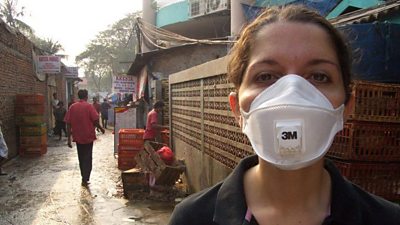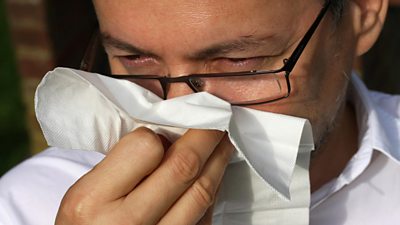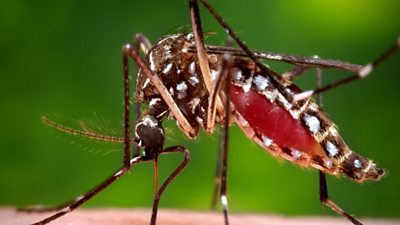A brief introduction to preventing communicable illness when making programmes.
What Can Go Wrong?
- Someone could contract an illness.
- We could spread infection to the general public or especially vulnerable people.
Legal/91�ȱ� Requirements
- Report any occupationally related ill health through MyRisks.
Control Measures
General Controls
- Carry out research before visiting site to establish what you need to do and any local rules or procedures.
- Avoid physical contact with body fluids & contaminated dressings or items.
- Don’t sit on hospital beds unless permitted to do so by local staff.
- Maintain good hygiene e.g. wash hands using good technique.
- Get specialist advice from 91�ȱ� Safety for high risk infections, example; Ebola or other tropical epidemics.
- Don’t visit farms or attend sheep births if pregnant.
- Don’t eat, drink or smoke without washing your hands (or using an alcohol gel or disposable hand wipe if in the field).
- Avoid placing cameras or other equipment where it can be contaminated and clean down using fast acting antimicrobial wipe.
- Monitor your own health and report to your own doctor / 91�ȱ� Occupational health if unwell.
Protecting others
- Don’t attend places with sick, old or vulnerable people if you are ill yourself.
- Check with your team if anyone needs particular consideration e.g. is pregnant or immune compromised.
- Follow any site specific recommendations for infection control.
Division Specific Issues
Sports
- Boxing: Human blood can be sprayed in fine droplets or spilt in the boxing ring.
News and TV
- Journalism and reality programming can require work with potentially contaminated individuals.eg refugee camps, homeless people, tropical / disease epidemics.
- TV: series on animals and farming. Check human / animal vectors.
FAQs/Did You Know?
- You must ensure you have appropriate vaccinations and medical support for international travel.
- Remember to manage emotional trauma, and use the EAP if needed (see Recommended Links (Gateway)). Whilst the EAP is an employee benefit, it can be made available to freelancers under certain circumstances (contact HR for advice).
Recommended links
-
[Gateway]
-
[Gateway]
-
-
Disease-specific topics
-

Bird Flu
Advice for staff covering the outbreak of avian 'flu in Yorkshire in 2014 -

Living with Coronavirus (Covid-19) – advice for staff
Advice for staff about travel and/or interviewing guests -

Disease and Contact with Viruses and Bacteria
A guide for anyone deployed to areas where there is risk from infectious disease from human, animal, insect or parasite sources, including zoonoses. These controls can also apply to harmful bacteria found in incidents such as sewage spills. -

Ebola Virus Disease (EVD)
Ebola is a contagious and often fatal illness which has had periodic outbreaks in the DRC and Sudan. -

Influenza ('Flu)
A guide to influenza, or 'flu', for individuals seeking general advice or during an epidemic or pandemic situation. -

MERS: Middle East Respiratory Syndrome
This is a virus that is new to humans and was first identified in Saudi Arabia in 2012. -

Mpox (monkeypox)
Requirements to be met for Mpox (2024) outbreak coverage and/or travelling to work in areas where there are high reported cases of Mpox. -

Zika Viral Disease
Zika Viral Disease is a mosquito-borne disease caused by the Zika virus. In 2015, the World Health Organisation declared it a global public health emergency.
More from SSR
-
Your platform to record accidents, risk assessments, assurance monitoring and inspections
-
Safety Equipment Stores
Just one number to call: 020 3614 5155 -
91�ȱ� Safety Guidelines
An A-Z of 91�ȱ�'s Health and Safety Guidelines -
Safety Advice Line: 0370 411 0464 Email: safety@bbc.co.uk
Events guidance - key links:
- Exhibitions
- General Guidance
- Indoor Location Recce Checklist
- Outdoor Location Recce Checklist
- Major Incidents & Emergency Planning
- Marketing and Promotional
- Noise Exposure
- Planning and Management
- Responsibilities
- Responsibilities Form
- Laser Lighting Effects
- Strobe Lighting
- Temporary Stages and Rostra
Health topics - key links:
- (91�ȱ� network only)
- Contributors Fitness to Participate
- Display Screen Equipment (DSE)
- (91�ȱ� network only)
- First Aid and Welfare on Location
- International Travel - Risks & Health
- Manual Handling
- Mental Health: 91�ȱ�page
- (91�ȱ� network only)
- Personal Health and Wellbeing
- Pregnancy
- Psychological Trauma Support & Trauma Risk Management (TRiM)
- Tiredness and Fatigue
- Travel Health Contacts
91�ȱ� High Risk - key links:
- CBRN and Industrial Spills
- Covert Filming
- Crisis Management and Security Support
- Demonstrations, Protests and Crowds
- Disaster Coverage
- Door Stepping
- (91�ȱ� network only)
- (91�ȱ� network only)
- Public Order
- Safety Equipment Stores
91�ȱ� Journalism - key links:
91�ȱ� Productions - key links:
- Aerial Filming and Airfields
- Animals: Displaying and handling for performance
- Boats: Working on
- Children and Young People
- Driving
- Electrical Equipment and Systems
- First Aid and Welfare on Location
- Food Safety (Cooking and Catering)
- Remote Location Working
- Roads and Streets: Working by
- Security of Productions on Location
- Stunts
- Tiredness and Fatigue
- Unmanned Aerial Systems (UAS aka Drones)
- Vehicles: Recording in, from and around
- Working at Height: Mobile Elevating Work Platforms
- Working at Height: Tower Scaffolds
91�ȱ� Radio - key links:
- (91�ȱ� Network only)
91�ȱ� Security - key links:
91�ȱ� Sport - key links:
About this site
This site describes what the 91�ȱ� does in relation to managing its health, safety and security risks and is intended for those who work directly for the 91�ȱ�.
It is not intended to provide instruction or guidance on how third parties should manage their risks. The 91�ȱ� cannot be held liable for how this information is interpreted or used by third parties, nor provide any assurance that adopting it would provide any measure of legal compliance. More information
Some links on this site are only accessible when connected to the 91�ȱ� network
